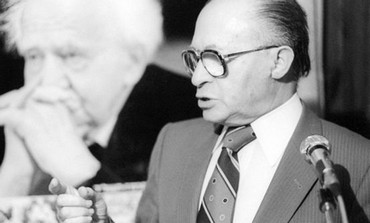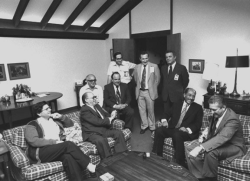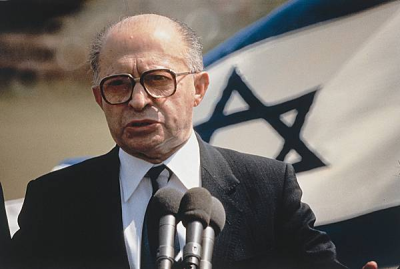The Quintessential Jew

Photo by: gpo
It was Menachem Begin’s first day in office as prime minister – Tuesday, June 21, 1977 – and I was unexpectedly summoned into his presence. As I walked through the door, he glanced up sharply through his thick, black-rimmed spectacles, dwarfed by the gigantic mahogany desk behind which he sat.
The signs of a recent heart attack were still upon him. His face was sallow, his cheekbones pronounced, his semi-bald crown thrown into prominence. Yet he was impeccably neat and imperious, like a patrician, a man to be addressed by title, not by name.
In a voice so formal it sounded like an official pronouncement, he declared,
“I have this day received a letter of invitation to Washington from the president of the United States of America, Mr. Jimmy Carter, and I wish you to look it over with a view to preparing a reply.”
I was taken aback. That he, the leader of a just-elected, power-hungry party, many of whose stalwarts had fought under him in the underground and had stood by him through thick and thin during his decades in the political wilderness – that he should ask me, not one of his party loyalists, to help compose a letter to the president of the United States made me sit up with the ramrod posture of a new recruit.
All I could do was nod, and croak for permission to retire in order to draft a response, as was my wont with his predecessors.
But he, in a tone that was just a shade supercilious, said there was no need for that any more. He wrote his own English letters and speeches. What he needed was someone to touch them up. “I will prepare the reply, and you will Shakespearize it,” he said with an encouraging smile. And then, in English, by way of explanation.
“Polish my Polish English. Stylize it. Give it a touch of Shakespeare.”
I was quick to learn that the new prime minister delighted in inventing neologisms – creating new words or new meanings for established words. He had just invented one now.
The telephone buzzed.
The prime minister had two telephones on his desk, one cream-colored – a regular push-button line – and the second a red point-to-point military set, linked directly to the defense people in Tel Aviv. He stared at the buzzing red mechanism as if he had an aversion to it.

A rare cordial meeting at Camp David of Aharon Barak, Menachem Begin, Anwar Sadat, Ezer Weizmann, at Camp David, 1978
Tightening his lips, he delicately picked up the receiver and gravely said, “Hello?” It was Ezer Weizman, his new defense minister. From what was being said, I gathered that there had been two PLO Katyusha attacks from southern Lebanon into northern Israel, albeit with no casualties or damage. Also, overnight, Muslim militia had slaughtered the inhabitants of a Christian village.
Austerely, his expression pained, the prime minister said into the phone that the PLO attack might well be a deliberate test of his will on this, his first day in office. He therefore suggested a commensurate response.
“And as for the Muslim attack on the Christians,” he added in a tone that was sharp, stubborn and dogged, “the policy of our new government is clear. It is our moral duty as a Jewish state to come to the aid of the Lebanese Christian minority. We shall come to the aid of any persecuted minority in the Middle East. The Christian world has abandoned the Maronites. We shall not abandon them.”
I sat dumbfounded. Begin had just turned Israel’s Lebanese doctrine on its head.

For the first time, the Jewish state had at its head a prime minister who was a companion of the old school. No other premier before – or since – possessed his cozy acknowledgment of God, his deep reverence for the Jewish heritage, his innate sense of Jewish kinship, and his familiarity with the ancient customs.
None had his infectious common touch that made Jews everywhere feel they really mattered. Politics aside, Jews in the Diaspora bonded with him in spirited spontaneity, and under his tutelage the Jewish state became more Jewish than ever it was before.
Click here to read more about Menachem Begin, the quintessential Jew.
Yehuda Avner, the writer, is a veteran diplomat and prime ministerial aide, is the author of the best-selling The Prime Ministers (Toby Press), and now a major documentary (Moriah Films).
Who do you think is the Quintessential Jew?
Share your thoughts, TODAY!
Share your thoughts, TODAY!



